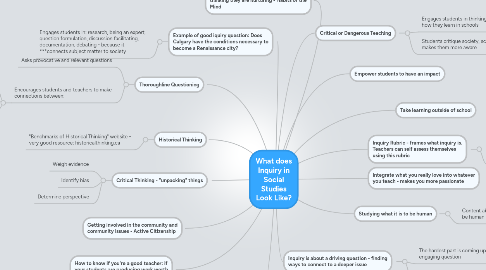What does Inquiry in Social Studies Look Like?
by aj janzen

1. How to know if you're a good teacher: if your students are producing work worth doing and of lasting value
2. Student thinking and work should be rooted in the real world
3. Getting involved in the community and community issues - Active Citizenship
4. Critical Thinking - "unpacking" things
4.1. Weigh evidence
4.2. Identify bias
4.3. Determine perspective
5. Historical Thinking
5.1. "Benchmarks of Historical Thinking" website - very good resource: historicalthinking.ca
6. Thoroughline Questioning
6.1. Asks provocative and relevant questions
6.2. Encourages students and teachers to make connections between:
6.2.1. Self
6.2.2. Subject Matter
6.2.3. Society in which they live
7. Example of good iquiry question: Does Calgary have the conditions necessary to become a Renaissance city?
7.1. Engages students in: research, being an expert, question formulation, discussion facilitating, documentation, debating - because it ***connects subject matter to society
8. Makes students aware of which way of thinking they are nurturing - Habits of the Mind
9. Inquiry Rubric - frames what inquiry is. Teachers can self assess themselves using this rubric
9.1. authenticity, academic rigour, assessment, life skills, appr. use of technology, active exploration, connecting with experts, elaborated communication, compassion
10. Integrate what you really love into whatever you teach - makes you more passionate
11. Studying what it is to be human
11.1. Content about real world and what it means to be human
12. Inquiry is about a driving question - finding ways to connect to a deeper issue
12.1. The hardest part is coming up with a good engaging question
12.2. Need to choose the right resource to hook kids
13. Critical or Dangerous Teaching
13.1. Engages students in thinking about what and how they learn in schools
13.2. Students critique society, schools, and thus makes them more aware
14. Empower students to have an impact
15. Take learning outside of school


